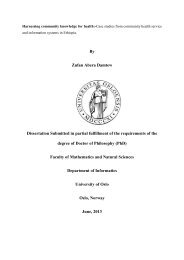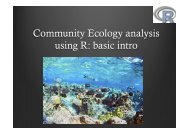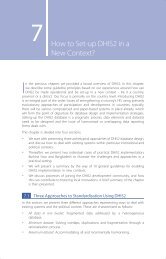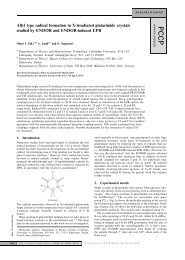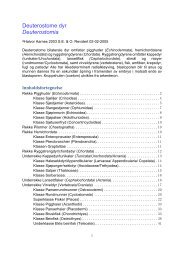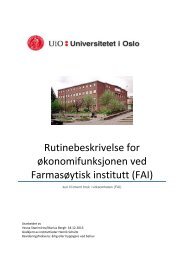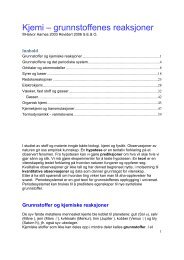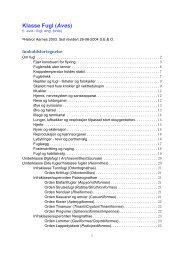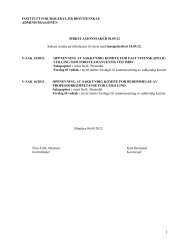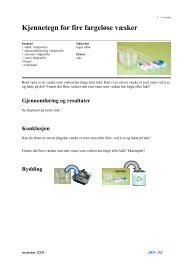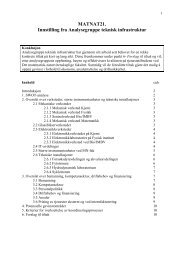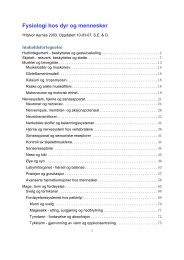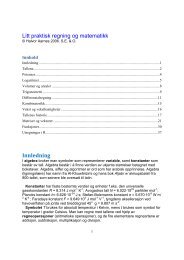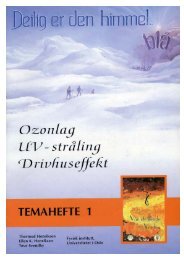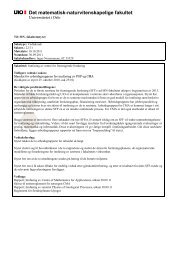Evaluation of individual research units - Norges forskningsråd
Evaluation of individual research units - Norges forskningsråd
Evaluation of individual research units - Norges forskningsråd
Create successful ePaper yourself
Turn your PDF publications into a flip-book with our unique Google optimized e-Paper software.
<strong>Evaluation</strong> <strong>of</strong> biology, medicine and health <strong>research</strong> in Norway (2011)<br />
Some members <strong>of</strong> the Panel recommended that the group focus more on either ecological<br />
or aquaculture <strong>research</strong> to maximise future funding and publication output. This group<br />
might better capitalise on new molecular methods that can be applied to aquaculture<br />
<strong>research</strong> and ecosystem modelling, perhaps by hiring new staff. There appear to be<br />
thematic links between <strong>research</strong> undertaken by this group and the Modelling &<br />
Evolutionary Fisheries group. Some members <strong>of</strong> the Panel thought the Department <strong>of</strong><br />
Biology should consider whether to merge these <strong>units</strong>.<br />
Societal impact<br />
This group’s work on the myriad effects <strong>of</strong> aquaculture on coastal ecosystems and food<br />
production is extremely important to Norwegian society and stakeholders. Production <strong>of</strong><br />
larval marine fish is <strong>of</strong> direct benefit to the aquaculture industry and studies tracing<br />
origins <strong>of</strong> fish products are <strong>of</strong> moderate societal importance in a country with<br />
considerable economic reliance on fisheries.<br />
Modelling & Evolutionary Fisheries<br />
Grading <strong>of</strong> scientific quality<br />
Good to Very Good<br />
Description <strong>of</strong> unit<br />
Two <strong>research</strong> groups were evaluated as a single unit in this assessment: the Modelling<br />
Group (MG) and the Evolutionary Fisheries Ecology (EvoFish) group.<br />
The MG contains four permanent faculty members (three pr<strong>of</strong>essors and one associate<br />
pr<strong>of</strong>essor) plus three additional <strong>research</strong> scientists. Most staff are male and all but two<br />
are Norwegian. The group focuses on <strong>individual</strong>-based models to explore environmental<br />
effects on evolution (<strong>of</strong> pelagic fishes, for example) and on the dynamics <strong>of</strong> marine<br />
populations and communities.<br />
The EvoFish group was formed in autumn 2007 with a grant from the Bergen Research<br />
Foundation. Between 2007 and 2010 the group had only one full-time <strong>research</strong> scientist<br />
(male, Finnish), one postdoctoral fellow (female, Finnish) and three PhD students (two<br />
international and one Norwegian). The group is essentially an <strong>of</strong>fshoot <strong>of</strong> MG but<br />
focuses its <strong>research</strong> more narrowly on the effect <strong>of</strong> fishing on the evolution <strong>of</strong><br />
economically-important fish stocks harvested in Norway.<br />
General evaluation & recommendations<br />
The MG has shown it can adapt, as exemplified by the creation <strong>of</strong> the EvoFish group.<br />
Modelling requires collaboration and both MG and EvoFish have national and<br />
international collaborations. The groups have a relatively high rate <strong>of</strong> publication in peerreviewed<br />
journals and strong public relations with both the general scientific community<br />
and the public. They have been able to successfully model the evolutionary effects <strong>of</strong><br />
fishing on fish populations.<br />
The number <strong>of</strong> staff has fluctuated recently, but loss <strong>of</strong> some <strong>research</strong>ers may be<br />
compensated by newly appointed EvoFish staff. The self-assessment document does not<br />
explain proposed use <strong>of</strong> the new guppy lab. Additionally, there are few Norwegian PhD<br />
students and postdoctoral fellows.<br />
35



